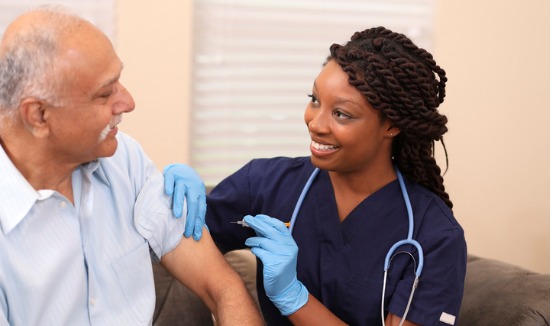Approximately 13% (1 in 8) of women in the U.S. are going to develop invasive breast cancer in the course of their life.* Aside from some forms of skin cancer, breast cancer is the most common cancer among American women. Black women die from breast cancer at a higher rate than White women.**
According to the American Cancer Society, many women with breast cancer have no symptoms, which is why regular breast cancer screening is so important. Screening can improve outcomes. Early detection reduces the risk of dying from breast cancer and can lead to a greater range of treatment options and lower healthcare costs. Most experts agree that regular breast screening is beneficial in identifying breast cancer early.
- The earlier the condition is diagnosed, the better the chances of surviving it.
- The patient is less likely to need their breast removed (a mastectomy) or chemotherapy if breast cancer is detected at an early stage.
Measure Compliance
Female members 50-74 years of age who had at least one mammogram to screen for breast cancer between 10/01, 2 years prior to the measurement year, and 12/31 of the measurement year.
Measure Tips
- This measure evaluates preventive screening only. Bilateral or unilateral screening mammograms are acceptable. Biopsies, breast ultrasounds, or MRIs are not.
- Results can be submitted for medical record review throughout the year.
- The advanced illness exclusion can be identified from a telephone visit, e-visit, or virtual check-in.
Measure Exclusions
Palliative Care; Hospice; Frailty and Advanced Illness; Patients with Bilateral or (2) Unilateral Mastectomies; Ages 66+ living long-term in an institution for 90+ consecutive days during the measurement period.
Note: Exclusions must be coded.
Best Practices
Educate members on the importance of:
- Getting an annual or biennial mammogram to screen for early detection.
- Oftentimes there are no symptoms.
- Much greater chance of successful treatment when detected early.
- Self-exams and how frequently they should be conducted.
- Contacting their doctor with questions and concerns, especially if a change in their breast is detected.
Other Tips:
- Discuss common fears of testing.
- Submit the appropriate ICD-10 diagnosis code that reflects a member’s history of bilateral mastectomy (Z90.13), if applicable.
- Attempt to obtain reports for member-reported screening. Notate the place of service if unable to obtain the report.
HealthCare Partners (HCP) is here to help!
HCP Pharmacy Staff
Call: (516) 515–8861
Monday through Friday, 8:30am – 5:30pm EST
HCP Case Managers
Call: (888) 258–0203
Monday through Friday, 8:30 am – 5:30 pm EST
Our Case Managers can:
- Teach patients about their condition.
- Guide them in making a treatment plan.
- Help them get medications and care.
- Coordinate transportation based on member’s assigned benefit.
- Set up referrals and doctor visits.
- Provide a Nurse on call, 24/7 at (516) 238-6124.
Download Breast Cancer Screening (BCS)
*www.breastcancer.org
**Centers for Disease Control and Prevention (CDC) 2023. “Breast Cancer Statistics.” https://www.cdc.gov/cancer/breast/statistics/index.htm








